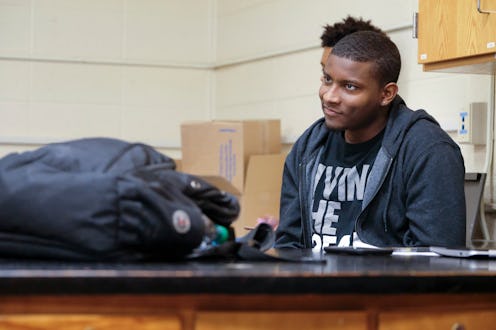Entertainment
This Docuseries Will Make You Realize How Wrong It To Look Down On Teens

Shows like 13 Reasons Why have attempted to portray how technology, but the docu-series Undercover High is making an attempt to witness modern teenage life firsthand. What the "undercover adults" who volunteered to go back to high school have learned already in just one episode, is that the way teenagers communicate and operate in school has changed a lot in a shockingly short period of time. What they say, on the other hand, is not that different.
The regular students at the Topeka, Kansas school where these undercover adults have been planted were told that a documentary is being filmed, but not that the seven transfer students taking classes and trying to make friends are part of Undercover High (executive producer: Kimberly Woodard) as well. According to the superintendent, the goal of the series is for these adults to make observations that will help the administration improve schools — and hopefully it makes for compelling television as well.
One of the interesting things about the show is that the participants, the secret adults attending high school, are between the ages of 22 and 25. While many of them are out of college, and at least one is a newlywed, none of them are that far removed from their own Senior years — and yet so many of them are completely thrown by the subtle and drastic differences between their experiences and what they're witnessing today.
Most of the adults immediately notice the lack of focus that they perceive the students have, the fact that they're always on their phones, and the disrespect they see them showing adults. That could just be a sign of their own maturity, because we were all like that in one way or another when we were teenagers. Right now, these "undercover" students are relating more to the teachers in the school than the kids they're observing, though they may be closer to the latter in age. There's a pastor in the bunch whose earnest excitement to inspire and reach out to the youth is almost certainly going to get him caught.
Once the undercover students become more immersed in the student population, the observations they share in confessional interviews and via voiceover are likely to be more nuanced and empathetic.
Lina, one of the participants who is featured in the first episode, certainly made some pretty serious revelations. She and her older brother are doing the social experiment together. Lina says wants to use this experience as a way to understand and reach out to the Hispanic community, and starts to make some headway in understanding the racial politics of the school, but ends up dealing with some frankly horrifying sexual harassment that supersedes that. After her first day she is immediately inundated with friend requests and messages on multiple platforms. She's leered at in the hall, and some girls warn her brother about the guys at school as well being jerks and/or dangerous to associate with at all.
It's an interesting role reversal for the siblings right off the bat. Jorge, who came out as gay when he was in high school, was used to his sister coming to his rescue when he was the target of harassment and bullying. Now he feels protective over her.
At the end of the episode, Lina is accidentally added to a group message with 22 people in it that was about her — which seems a little too convenient, possibly contrived, but go with it — and the messages escalated from the boys talking about asking her out, to getting her to do drugs with them, have sex, and then rape. So that's obviously concerning. Lina had already noticed that the boys messaging her use disrespectful, objectifying language and get mad when she (of course) doesn't respond. Then behind her back they're casually talking about assaulting her.
Whether these are threats with real intentions behind them, either from a student or from an adult infiltrating a student group chat (one of the the school's administrators alluded to this being a problem); or the escalation of a conversation for shock value or to seem tough, the mere fact that anyone thinks these messages are acceptable is problematic and horrifying. And aggressively sexual chats are just one of the ways in which rape culture manifests for these teens. The fact that harassment is happening on Facebook now is not the only problem, it's that harassment still happens at all. Street harassment, comedians who make tasteless rape jokes, and the whole concept of "locker room talk" proves that the technology is only changing the way in which these messages are communicated.
One of the themes of the series and the social experiment at large is that kids will say things to a peer (or reveal them in a group message) that they wouldn't tell an adult. It's not the platform that should be of particular concern, it's what's being said. So though the undercover students may be currently reeling over the speed with which youth culture has moved on from their days, it seems that the time that they spend embedded with the teens will begin to illuminate all the ways in which their high school experiences actually line up.